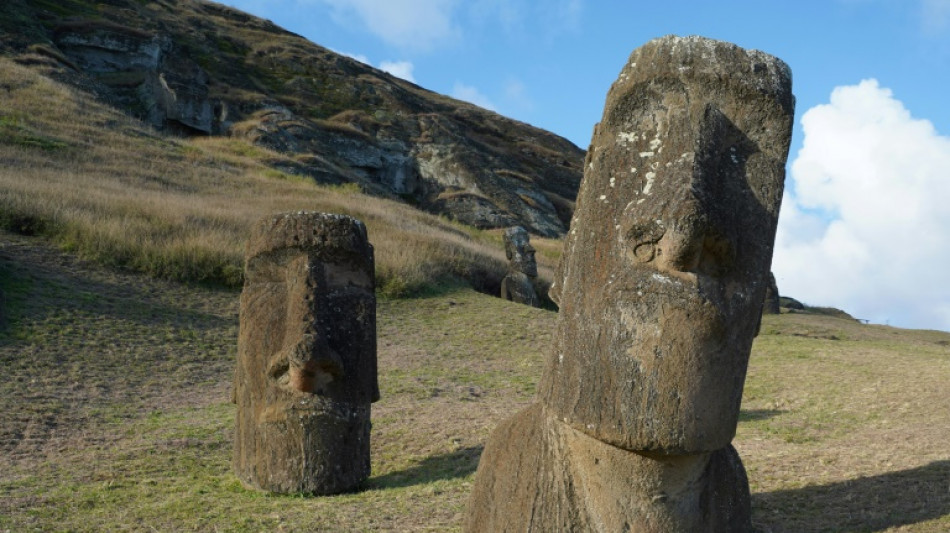
-
 Springboks skipper Kolisi wary of England's 'gifted' Smith
Springboks skipper Kolisi wary of England's 'gifted' Smith
-
End of a love affair: news media quit X over 'disinformation'

-
 US finalizes up to $6.6 bn funding for chip giant TSMC
US finalizes up to $6.6 bn funding for chip giant TSMC
-
Scholz urges Ukraine talks in first call with Putin since 2022

-
 Zverev reaches ATP Finals last four, Alcaraz on brink of exit
Zverev reaches ATP Finals last four, Alcaraz on brink of exit
-
Lebanon rescuer picks up 'pieces' of father after Israel strike

-
 US retail sales lose steam in October after hurricanes
US retail sales lose steam in October after hurricanes
-
Zverev reaches ATP Finals last four with set win against Alcaraz

-
 Kerevi back for Australia against Wales, Suaalii on bench
Kerevi back for Australia against Wales, Suaalii on bench
-
Spate of child poisoning deaths sparks S.Africa xenophobia

-
 Comedian Conan O'Brien to host Oscars
Comedian Conan O'Brien to host Oscars
-
Rozner overtakes McIlroy and Hatton for Dubai lead

-
 Mourners bid farewell to medic killed in east Ukraine
Mourners bid farewell to medic killed in east Ukraine
-
Gore says 'absurd' to hold UN climate talks in petrostates

-
 Hamas says 'ready for ceasefire' as Israel presses Gaza campaign
Hamas says 'ready for ceasefire' as Israel presses Gaza campaign
-
Amorim says Man Utd is 'where I'm supposed to be'

-
 Japan hammer Indonesia to edge closer to World Cup spot
Japan hammer Indonesia to edge closer to World Cup spot
-
Jeff Beck guitar collection to go under the hammer in January

-
 Veteran Ranieri has 'no time for mistakes' on Roma return
Veteran Ranieri has 'no time for mistakes' on Roma return
-
Van Nistelrooy says he will 'cherish' Man Utd memories in farewell message

-
 IAEA chief tours sensitive Iran nuclear plants
IAEA chief tours sensitive Iran nuclear plants
-
Pompeii rejects 'mass tourism' with daily visitor limit

-
 Jailed Russian poet could be 'killed' in prison, warns wife
Jailed Russian poet could be 'killed' in prison, warns wife
-
French court orders release of Lebanese militant held since 1984

-
 Global stocks struggle after Fed signals slower rate cuts
Global stocks struggle after Fed signals slower rate cuts
-
UK economy slows, hitting government growth plans

-
 Primary schools empty as smog persists in Indian capital
Primary schools empty as smog persists in Indian capital
-
Palestinians turn to local soda in boycott of Israel-linked goods

-
 Typhoon Man-yi bears down on Philippines still reeling from Usagi
Typhoon Man-yi bears down on Philippines still reeling from Usagi
-
UK growth slows in third quarter, dealing blow to Labour government

-
 Chris Wood hits quickfire double in NZ World Cup qualifying romp
Chris Wood hits quickfire double in NZ World Cup qualifying romp
-
Markets struggle at end of tough week

-
 China tests building Moon base with lunar soil bricks
China tests building Moon base with lunar soil bricks
-
Film's 'search for Palestine' takes centre stage at Cairo festival

-
 Oil execs work COP29 as NGOs slam lobbyist presence
Oil execs work COP29 as NGOs slam lobbyist presence
-
Gore says climate progress 'won't slow much' because of Trump

-
 'Megaquake' warning hits Japan's growth
'Megaquake' warning hits Japan's growth
-
Stiff business: Berlin startup will freeze your corpse for monthly fee

-
 Wars, looming Trump reign set to dominate G20 summit
Wars, looming Trump reign set to dominate G20 summit
-
Xi, Biden attend Asia-Pacific summit, prepare to meet

-
 Kyrgios to make competitive return at Brisbane next month after injuries
Kyrgios to make competitive return at Brisbane next month after injuries
-
Dominican Juan Luis Guerra triumphs at 25th annual Latin Grammys

-
 Landslide win for Sri Lanka president's leftist coalition in snap polls
Landslide win for Sri Lanka president's leftist coalition in snap polls
-
Australian World Cup penalty hero Vine takes mental health break

-
 As Philippines picks up from Usagi, a fresh storm bears down
As Philippines picks up from Usagi, a fresh storm bears down
-
Tropical Storm Sara pounds Honduras with heavy rain

-
 Pepi gives Pochettino win for USA in Jamaica
Pepi gives Pochettino win for USA in Jamaica
-
'Hell to heaven' as China reignite World Cup hopes with late winner

-
 Rebel attacks keep Indian-run Kashmir on the boil
Rebel attacks keep Indian-run Kashmir on the boil
-
New Zealand challenge 'immense but fantastic' for France

| CMSC | 0.04% | 24.56 | $ | |
| SCS | 0.23% | 13.3 | $ | |
| AZN | -2.43% | 63.5 | $ | |
| BTI | 1.83% | 36.15 | $ | |
| BCE | -0.85% | 26.615 | $ | |
| RIO | 0.85% | 60.945 | $ | |
| GSK | -2.26% | 33.2489 | $ | |
| NGG | 0.28% | 62.542 | $ | |
| BCC | -0.29% | 139.94 | $ | |
| RYCEF | 0.88% | 6.85 | $ | |
| CMSD | 0.17% | 24.4 | $ | |
| RBGPF | 2.67% | 61.84 | $ | |
| BP | -0.03% | 29.04 | $ | |
| JRI | -0.28% | 13.04 | $ | |
| RELX | -3.26% | 44.5 | $ | |
| VOD | 0.86% | 8.755 | $ |

'Ecocide' on Easter Island never took place, studies suggest
Two recent studies have cast doubt on a popular theory that the ancient residents of Easter Island suffered a societal collapse because they overexploited their natural resources, an event often labelled one of history's first "ecocides".
Easter Island, located in the Pacific Ocean 3,700 kilometres (2,300 miles) from the coast of Chile, is best known for the enigmatic "moai" stone statues of humans carved by the Rapanui people.
A widespread theory popularised by historians including US author Jared Diamond claimed that the Rapanui deforested the small island -- which is known to have once been covered in palm trees -- to keep supporting the flourishing culture of its more than 15,000 inhabitants.
The sudden lack of resources is said to have triggered a brutal period of famine and warfare that escalated into cannibalism and ended in a demographic and cultural collapse.
This event in the 1600s abruptly brought an end to the creation of new moai statues -- or so the story goes.
When Europeans first arrived at the island in 1722, they estimated there were only around 3,000 inhabitants.
This tale of ecological suicide -- or "ecocide" -- by the Rapanui "has been presented as a warning tale for humanity's overexploitation of resources," according to the authors of a study published in the journal Nature on Wednesday.
The international team of experts in population genetics tried to find signs of the societal collapse using an advanced statistical tool that reconstructs the genomic history of a people.
They analysed the genomes of 15 Rapanui who lived between 1670 and 1950 -- and found no sign of a societal collapse, which would have caused a sudden reduction in genetic diversity.
"Our genetic analysis shows a stably growing population from the 13th century through to European contact in the 18th century," said study author Barbara Sousa da Mota of the University of Lausanne.
"This stability is critical because it directly contradicts the idea of a dramatic pre-contact population collapse."
The research also shed light on contact between the island's residents and Native Americans well before Christopher Columbus arrived in the Americas -- another controversial moment in the history of the Polynesian people.
- Different method, same conclusion -
The new research reinforced the findings of a different study published in June in the journal Science Advances which took a very different approach.
That the two studies reached the same conclusion "shows the importance of looking at the same scientific question from different disciplines," Sousa da Mota told AFP.
The team behind the June study used satellite images to map out rock gardens on the island. Rock gardening is an agricultural method that involves mixing rocks into the soil to preserve nutrients and moisture.
Previous research had claimed that up to 21 square kilometres of the small island -- 12 percent of the total of 164 square kilometres -- was covered with these gardens, which would have been necessary to sustain more than 15,000 people.
- 'We can learn from them' -
But the US-based researchers determined that only 0.76 square kilometres of the island were used as rock gardens.
Such a small harvest of sweet potatoes -- essential to the Rapanui's diet -- from these gardens could not have supported more than 4,000 people, the researchers estimated.
That is close to the number of people that Europeans first found on the island, indicating there never was a society of 15,000 or more that endured a terrifying collapse.
"When we label an entire culture as an example of bad choices, or as a cautionary tale of what not to do, we had better be right, otherwise we feed stereotypes (which themselves have profound consequences on people)," Dylan Davis, a co-author of the Science Advances study, told AFP.
"In this case, the Rapanui managed to survive in one of the most remote places on Earth and did so fairly sustainably until European contact," said the environmental archaeologist at Columbia University.
"This suggests we can learn something from them about how to manage limited resources."
H.Romero--AT


